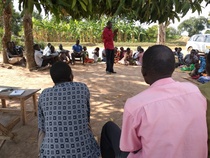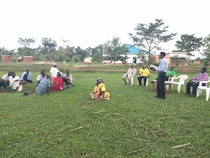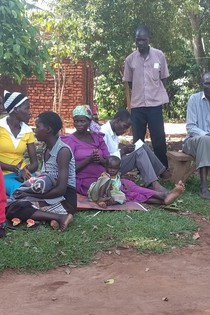by Kelly Child, Managing Director
As we select new Healthy Villages each year, we kick off activities with a series of meetings: first, with the executive committee of the village, and then with the community at large. At the meetings we officially introduce our program to the village and set expectations.
Each village we work in is unique, and these initial meetings give us a little smattering of the underlying personalities we will learn over the next three years. Below are my initial impressions of the villages.
21 March 2017, Irenzi village, Nambale sub-county
23 March 2017, Bulondo village, Nambale sub-county
 With nearly 500 households, Bulondo village is large and widely spread. Because of this, we decide to conduct two separate meetings, which immediately illuminates the fact that interns living in this village will have nearly double the work as they try to implement activities this summer. Due to a slight miscommunication, the VHTs mobilized the community for 4 pm, even though we've arrived for the meeting at 2 pm. So, in typical village fashion, we wait. When the meeting finally begins, we find the community members are a vibrant and lively bunch. Several participants, both male and female, have questions -- mostly surrounding reproductive health. "Do you provide long-term family planning for men?" one male participant asks, and others request outreaches specifically for adolescents. Later, Titus provides a thorough description of the internship program, and the LC comments, "Please know that we do not have guns, but I can assure your (interns') security." His understanding of American security may have been influenced by Hollywood action movies, but we know that his comment about keeping interns safe is heartfelt and accurate.
With nearly 500 households, Bulondo village is large and widely spread. Because of this, we decide to conduct two separate meetings, which immediately illuminates the fact that interns living in this village will have nearly double the work as they try to implement activities this summer. Due to a slight miscommunication, the VHTs mobilized the community for 4 pm, even though we've arrived for the meeting at 2 pm. So, in typical village fashion, we wait. When the meeting finally begins, we find the community members are a vibrant and lively bunch. Several participants, both male and female, have questions -- mostly surrounding reproductive health. "Do you provide long-term family planning for men?" one male participant asks, and others request outreaches specifically for adolescents. Later, Titus provides a thorough description of the internship program, and the LC comments, "Please know that we do not have guns, but I can assure your (interns') security." His understanding of American security may have been influenced by Hollywood action movies, but we know that his comment about keeping interns safe is heartfelt and accurate.
31 March 2017, Kamira village, Nambale sub-county
 As afternoon prayers finish, community members pour out of the mosque to find us sitting under the tree in the adjacent field. We invite them to join us, but they must first go home to have lunch and so promise to return. After a few minutes, members from Kamira's executive committee arrive. When one member is told that his fellow community members are having lunch and will be joining shortly, he remarks that "they might have gone home, but there is no food there." Because of a drought in December and January, many families are struggling to feed themselves, which makes the need to stay healthy even more acute. The meeting begins with only a few participants, but increases slightly as we move through the agenda. As we cover the most pressing health concerns in their village, someone mentions the lack of electricity in Kamira. Patrick, our WASH Program Manager, keenly responds, "Electricity without a latrine is not development. Build your latrine and electricity will find you."
As afternoon prayers finish, community members pour out of the mosque to find us sitting under the tree in the adjacent field. We invite them to join us, but they must first go home to have lunch and so promise to return. After a few minutes, members from Kamira's executive committee arrive. When one member is told that his fellow community members are having lunch and will be joining shortly, he remarks that "they might have gone home, but there is no food there." Because of a drought in December and January, many families are struggling to feed themselves, which makes the need to stay healthy even more acute. The meeting begins with only a few participants, but increases slightly as we move through the agenda. As we cover the most pressing health concerns in their village, someone mentions the lack of electricity in Kamira. Patrick, our WASH Program Manager, keenly responds, "Electricity without a latrine is not development. Build your latrine and electricity will find you."
12 April 2017, Muira village, Nambale sub-county
 Muira stands out from the other villages because the health issues brought by the community seem more serious. There is a high incidence of malaria, and water access is very poor. There is a burial the day of our first meeting, so only half of the executive committee attends, but we are told that the others are also invested in the upcoming UVP program. On the day of the community meeting, as we wait for things to get started, there are some younger men seated away from the group. Patrick explains to me that in Ugandan culture, it is not appropriate to mingle with your in-laws and that if you wanted to greet them, you should do so a good distance away in a squatting position to show your respect. The Chairperson opens the meeting by asking if community members welcomed health programs, and if so, to clap. There is boisterous clapping five minutes into the meeting and the remainder of the gathering was a continuation of this elation.
Muira stands out from the other villages because the health issues brought by the community seem more serious. There is a high incidence of malaria, and water access is very poor. There is a burial the day of our first meeting, so only half of the executive committee attends, but we are told that the others are also invested in the upcoming UVP program. On the day of the community meeting, as we wait for things to get started, there are some younger men seated away from the group. Patrick explains to me that in Ugandan culture, it is not appropriate to mingle with your in-laws and that if you wanted to greet them, you should do so a good distance away in a squatting position to show your respect. The Chairperson opens the meeting by asking if community members welcomed health programs, and if so, to clap. There is boisterous clapping five minutes into the meeting and the remainder of the gathering was a continuation of this elation.



